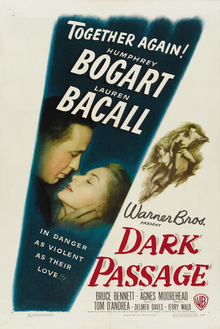Dark Passage (film)
| Dark Passage | |
|---|---|

theatrical release poster
|
|
| Directed by | Delmer Daves |
| Produced by | Jerry Wald |
| Screenplay by | Delmer Daves |
| Story by | David Goodis |
| Starring |
Humphrey Bogart Lauren Bacall |
| Music by | Franz Waxman |
| Cinematography | Sidney Hickox |
| Edited by | David Weisbart |
| Distributed by | Warner Bros. |
|
Release date
|
|
|
Running time
|
106 minutes |
| Country | United States |
| Language | English |
| Box office | $3 million (US rentals) |
Dark Passage (1947) is a Warner Bros. film noir directed by Delmer Daves and starring Humphrey Bogart and Lauren Bacall. The film is based on the novel of the same name by David Goodis. It was the third of four films real-life couple Bacall and Bogart made together.
The film is notable for employing cinematography that avoided showing the face of Bogart's character, Vincent Parry, prior to the point in the story at which Vincent undergoes plastic surgery to change his appearance. The majority of the pre-surgery scenes are shot from Vincent's point of view. In those scenes shot from other perspectives, the camera is always positioned so that its field of view does not include his face. The story follows Vincent's attempts to hide from the law and clear his name of murder.
Vincent Parry, a man convicted of killing his wife, has escaped from San Quentin prison by stowing away in a supply truck. He evades police and hitches a ride with a passing motorist named Baker. Parry's odd clothes and a news report on the radio about an escaped convict make Baker suspicious. When questioned, Parry beats him unconscious. Irene Jansen, who had been painting nearby, picks up Parry and smuggles him past a police roadblock into San Francisco, offering him shelter in her apartment.
An acquaintance of Jansen, Madge, comes by Irene's apartment. Parry, without opening the door, tells her to go away. Madge was a former romantic interest of Parry's whom he had spurned. Out of spite she testified at his trial, providing a motive as to why he would have killed his wife. When she returns, Irene explains that she had followed Parry's case with interest. Her own father had been falsely convicted of murder, and since then she has taken an interest in miscarriages of justice. She believes that Parry is innocent.
Parry leaves but is recognized by a cab driver, Sam. The man turns out to be sympathetic and gives Parry the name of a plastic surgeon who can change his appearance. Before the operation, Parry goes to the apartment of a friend, George Fellsinger, for help in proving his innocence and arranges to stay with him during the recuperation from surgery. Dr. Coley performs the operation. Parry, unable to speak, his face wrapped in bandages, returns to George's apartment only to find him murdered. He stumbles back to Irene's house, collapsing at her doorstep. Irene nurses him back to health.
...
Wikipedia
